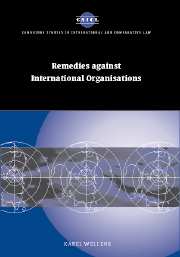Book contents
- Frontmatter
- Contents
- Acknowledgements
- List of abbreviations
- Introduction
- Part I General features of remedies against international organisations
- 1 The accountability regime for international organisations
- 2 Remedies against international organisations
- 3 The different levels of accountability and the appropriateness of various remedies: scope ratione materiae
- 4 Access to remedies
- 5 Remedies against whom: the scope ratione personae respondentis
- 6 The potential outcome of remedies: scope ratione remedii
- Part II Procedural aspects of remedial action against international organisations
- Part III Substantive outcome of remedial action against international organisations
- Part IV Alternative remedial action against international organisations and options for the future
- Conclusion
- Bibliography
- Index
- CAMBRIDGE STUDIES IN INTERNATIONAL AND COMPARATIVE LAW
1 - The accountability regime for international organisations
Published online by Cambridge University Press: 13 July 2009
- Frontmatter
- Contents
- Acknowledgements
- List of abbreviations
- Introduction
- Part I General features of remedies against international organisations
- 1 The accountability regime for international organisations
- 2 Remedies against international organisations
- 3 The different levels of accountability and the appropriateness of various remedies: scope ratione materiae
- 4 Access to remedies
- 5 Remedies against whom: the scope ratione personae respondentis
- 6 The potential outcome of remedies: scope ratione remedii
- Part II Procedural aspects of remedial action against international organisations
- Part III Substantive outcome of remedial action against international organisations
- Part IV Alternative remedial action against international organisations and options for the future
- Conclusion
- Bibliography
- Index
- CAMBRIDGE STUDIES IN INTERNATIONAL AND COMPARATIVE LAW
Summary
As for remedies against states and individuals – the accountability of the former always having been firmly rooted as one of the cornerstones of the international legal and political order, and the accountability of individuals also having entered into the body of international law – any discussion on the more procedural and consequential issues falling within the scope of redress against international organisations has to be correctly placed against the background of their accountability regime. Albeit in an embryonic form, it has been in place since the establishment of international organisations: such a regime's formulation and adjustment is bound to be a continuous process.
The need for a reasonably comprehensive and consolidated body of applicable rules, recommended practices and guidelines is all the more pressing given the ever-increasing calls from various quarters – states and non-state parties potentially affected in their interests and/or rights by the acts, actions or omissions of international organisations – for appropriate remedies to become available. In further elaborating the body of primary rules, care should be taken not to undermine pre-existing or emerging rules of legal liability or responsibility by inadvertently including them as merely good practice. The codification of principles common to all international organisations, as they have been listed by the ILA Committee on Accountability of International Organisations in its Second Report, could be a first, but crucial, step in establishing a comprehensive accountability regime.
- Type
- Chapter
- Information
- Remedies against International Organisations , pp. 7 - 9Publisher: Cambridge University PressPrint publication year: 2002



